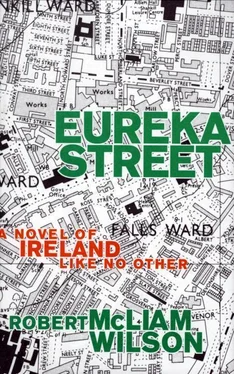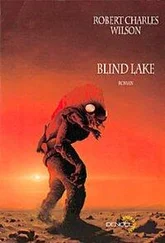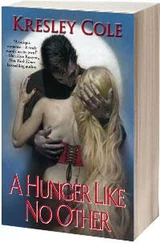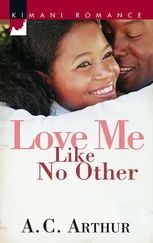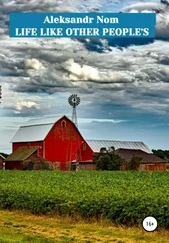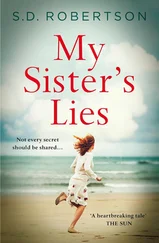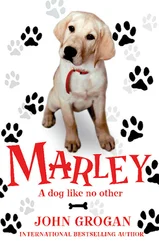For some, almost mystical, reason he could not quite grasp, he had feared that some great event had taken place upstairs with his damaged mother. When he had seen Peggy later, her face had been as strange and muted as Max's. He wondered what they had talked about.
They had spoken on the telephone subsequently. There had been a detachment in Max's words that the newly sensitive Chuckie had attributed to awkward kindness. She had told him that she was tired of violence following her around. She had left America with many people she knew violently dead and now it looked like Belfast was going to be the same. Chuckie had been disturbed by this notion but, in the end, he had decided there was nothing about which he should be anxious.
It was not as though he had given her no thought. Occupied by his mother as he was, Chuckie had dreamed of Max constantly. In these reveries, there was something besides his usual sensual gratitude. In the grip of his changing feelings about his mother, Chuckie found himself concluding that he felt larger things for this American girl than he could easily accommodate, fat though he was.
He hung up on Aoirghe without saying goodbye.
Nine o'clock that night, Chuckie was in the Wigwam with the boys. They were talking about the fact that the IRA had just issued violent threats against the unknown OTG movement. The IRA had been slow to call in their claim for the Fountain Street bombing (no one knew that this was caused by the number of vandalized phone boxes in the Moyard area). In the interim, a rumour began and circulated for some hours that the OTG might have been responsible for the outrage. Such rumours were quick to gain the currency of fact in Northern Ireland.The IRA, justly peeved, had now made its feelings clear. Chuckie knew that some of this was his fault, after the threats against Crab and Hally, but he had buried the memory with the ease he would have shown with a sexual mishap, a failed erection. Besides, unlike his friends, he had other things to think about.
`You're quiet,' said Jake, looking at Chuckie.
`Yeah,' he mumbled.
`Your mum's going to be OK, said Jake gently.
The general conversation ceased and the four young men tried to avoid looking sympathetically at their fat friend. There were a few coughs, and beers were slurped.
`It's not that,' Chuckie said.
`What is it?' asked Slat.
Chuckie told them about Max.
He was surprised to find how good it felt to tell them and how good it felt that they listened. He was surprised at the unanimity of their subsequent advice. Go after her, they all said. Follow her.You'll never find another like that.
It seemed absurd at first but, gradually, they talked him into considering it. Even Septic stopped watching women and joined in the general encouragement. Chuckie felt his eyes grow hot and prickly. He had never felt so liked.
`What about my old lady?' he asked.
`We'll look after her,' said Slat enthusiastically. `She'll be all right.'
The others murmured uneasy assent. Chuckie considered their proposal.
Ten hours later, Chuckie sat uneasily in the window seat of the fifteenth row of an aeroplane as it taxied into take-off position. He had rushed everything through. Luke had obtained a passport for him a couple of weeks before, believing multitudes of international money-making flights to be imminent. Jake had helped him out, booking the flight, driving him to the airport in Chuckle's own fat Mercedes, of which he had graciously granted Jake the use while he was away. Hesitantly, Chuckie had asked Jake to look after his mother in combination with Caroline Causton. He had thought long and hard about whom he would ask from amongst his friends. Caroline Causton would be around more or less permanently but he wanted something extra. Septic was not an option, Donal was often foolish. Slat seemed the obvious was gentle, good with women, the all-round socialist paragon. But there was something about Jake he had always trusted. And Jake said he would be glad to keep an eye on Peggy.
When he had guiltily told his mother what he proposed to do, he had been surprised by her reaction. Her face had shown a brief but unmistakable flicker of interest. Encouraged by this, he told her that he hated to leave her and that he would be back as soon as he could but that he felt he had to go.
`Good for you,' his mother had said distinctly, before closing her eyes and turning her face to the wall.
He spent a sleepless night, tortured by the necessity of following Max and abandoning his mother. He was torn between two sets of that's what he could now call them both. One he knew he could never lose: his mother, he felt now, without asking, would always love him. But Max might not have even begun to consider that possibility. He knew that, in some epic transatlantic way, he had to offer her that option.
As dawn approached, he racked his memory for details and venues from the life story that Max had told him. Phoenix. Miami. San Diego. New York. Hopelessly, he mapped out his search in his head.
That morning, as he had packed and waited bleary-eyed for Jake, he had looked around No. 42 in a guilty daze. All of the mail-order goods had now arrived. Jake and Caroline had already taken a sofa each but that left three. Aoirghe had promised to take another and Jake had suggested Oxfam for some of the rest of the stuff, but the mess in the house was nightmarish. It made him want to cry. It looked absurd, chaotic. It was typical. It looked just like him. It looked like all his clumsy love.
Seatbelt fastened, laces loosened, stationary on the tarmac, Chuckie remembered that he had never flown before. He was gripped by momentary provincial prole panic. He felt a light, almost fashionable perspiration on his face. Take-off, he was told, would be delayed fifteen minutes. Which, he felt, made it worse. As he thought about the take-off and the seven airborne hours ahead of him, he prayed that he would neither disgrace nor wet himself.
But Chuckie need not have worried. The Chuckieness in him meant that within five minutes he was asleep, and by the time the plane was taking off, he was open-mouthed and drooling, small chuffing noises not quite snores escaping from his nose and mouth. Chuckie drooled and chuffed all the way to America.
All along the street, sirens wailed and horns blared. Constant streams of people with hard faces joined the street from the spilling mouth of Broadway. Chuckle shuffled and dodged against the adamant flow of citizens. Small-town boy, he tried glancing at every face he passed. Those faces were keen as the wind, they were tight with tension and time.
The pavements reverberated under their sharp heels like drums or thunder. Chuckie, Belfast-born and Belfast-bred, had always delighted in lording it over yokels from the dark interior of Northern Ireland. If you were from Lurgan, Enniskillen, Omagh or Dungiven, Chuckie Lurgan would become the ultimate in urban, the complete cosmopolite. But now, as Manhattan walked and drove past him, Chuckie Lurgan was terrified.
He expected every face he saw or could not see to do him some form of big-city harm. He waited for someone to pull a gun or a blade. The constant sirens made him walk twitchily, with the delicacy and strangeness of a soldier patrolling no man's land. He was used to the traditions of Belfast brutality and gunplay but New Yorkers looked like they would all do it to you. They'd do it casually, quickly, and they'd enjoy it. Even the women looked terrifying. The women, especially, looked terrifying.
Chuckie was struggling towards Times Square, or so he hoped. He had an appointment to keep and was fearful lest he be late. He had woken with time to spare but had spent a couple of hours wandering around Manhattan blissfully frightened. He had wanted to walk somewhere famous, somewhere he had seen in the movies. But Chuckie had been in NewYork for only sixteen hours and he felt that he had as yet to stand somewhere that wasn't famous. The city seemed rotted by celebrity. Every sidewalk, every lamp-post, every taxicab he had seen before. At first intoxicated by the realization of all his cele- brophile fantasies, Chuckie was growing weary of big New York. He was tired of the tingle in his spine. Feeling epic all the time was proving a burden.
Читать дальше
